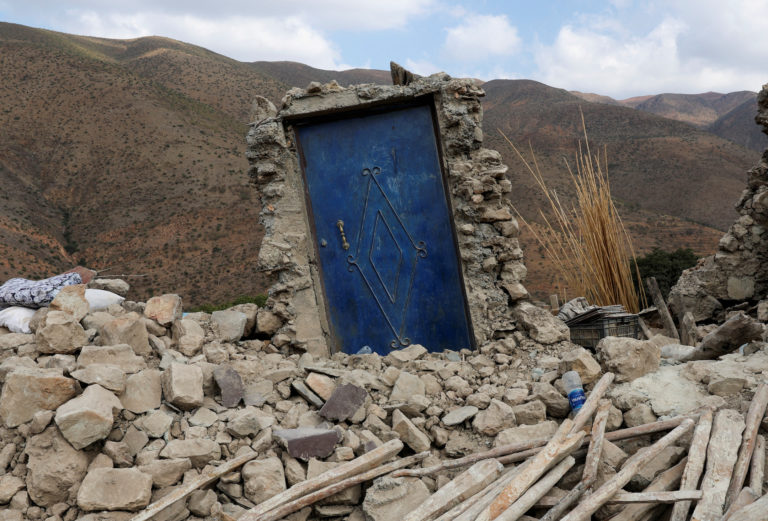Relief workers are responding to dual disasters in North Africa. The death toll in the Morocco earthquake has topped 2,900 while Libya counts at least 5,300 killed in catastrophic flooding. Special correspondent Alex Cadier reports.
Read the Full Transcript
- Amna Nawaz:Two major headlines share the spotlight tonight. In the U.S. Congress, House Speaker Kevin McCarthy has ordered an impeachment inquiry into President Biden.And, abroad, the Interior Ministry for Eastern Libya now says more than 5,300 people have been killed in catastrophic flooding. Plus, the death toll in the Morocco earthquake has topped 2,900.We begin with the North African disasters and special correspondent Alex Cadier.
- Alex Cadier:There’s water as far as the eye can see in parts of Eastern Libya, and out there as many as 10,000 missing people.Heavy rainfall and flooding from a Mediterranean storm late Sunday washed away entire towns and communities. This is the city of Derna, declared a disaster zone after two nearby dams collapsed, wiping out about a quarter of the city.
- Ibrahim Khatra, Municipality Official (through interpreter):Derna is literally facing a crisis. Areas have been completely cut off. It’s a disastrous situation with the flooding and the loss of lives.
- Alex Cadier:The city streets are filled with thick mud and piles of mangled debris, the coastline littered with cars stacked atop one another like toys from the force of the deluge.The dead are laid out in the open, shrouded with plastic tarps.
- Dax Roque, Norwegian Refugee Council:The reports that we are getting from our teams on the ground is that the situation is disastrous. Entire villages have been overwhelmed by the floods and the collapsed dams.
- Alex Cadier:Dax Roque is the Libya country director for the Norwegian Refugee Council. His team is providing lifesaving aid, including food and shelter, but the affected areas are hard to reach.
- Dax Roque:Roads have been washed away. The telecommunication is down. The Internet is down. I just want to urge the international community to mobilize resources immediately, so we can get those resources to our teams on the ground, so they can support the people and their most dire need at the moment.
- Alex Cadier:Drone footage captured this sprawling apartment complex in the city of Al-Marj surrounded by reddish muddy floodwaters.Elsewhere, the Libyan Red Crescent workers struggled to rescue people from their cars in near-waist-deep water. Amateur video showed the damage to roads around the town of Al Bayda, further complicating rescue and recovery efforts.And the hurdles are not only physical but also political. For years, Libya has been divided between two administrations, the United Nations-backed government in the West and the Libyan National Army in the East, including Derna, led by General Khalifa Haftar.Frederic Wehrey, Carnegie Endowment for International Peace: This is a military, militia-run regime that does not have the interests of its citizens at heart.
- Alex Cadier:Frederic Wehrey is a senior fellow in the Middle East program at the Carnegie Endowment for International Peace.
- Frederic Wehrey:How do you allocate funds for disaster preparedness? How do you empower towns like Derna to prepare themselves for these kinds of weather-related events? All of that has become incredibly politicized, and it’s fallen victim to this political split.
- Alex Cadier:There are small glimmers of hope, as humanitarian assistance starts to arrive. Turkey and the United Arab Emirates have sent planes carrying much-needed aid along with search-and-rescue workers.Meanwhile, Morocco is still reeling from a 6.8-magnitude earthquake on Friday night. Its epicenter was in the Al Haouz province south of Marrakesh.The United Nations estimates the quake impacted some 300,000 people.
- Woman (through interpreter):We have escaped death. No matter how much we tell you what happened, you cannot imagine what really happened. We have seen death with our own eyes.
- Alex Cadier:The death toll continues to climb as rescue crews dig through the rubble of collapsed homes in what’s left of remote villages high in the Atlas Mountains. Many were mud brick structures unable to withstand the country’s most powerful earthquake in more than a century.But, amazingly, rescuers are still pulling out survivors days later.
- Patrick Villardry, Volunteer (through interpreter):What we are doing here is using rescue dogs to locate the victims. We found the kitchen where the person went missing, so we started digging in order to release them.
- Alex Cadier:Military helicopters are starting to evacuate some of the wounded left stranded in remote areas. The province’s only military field hospital also opened today to treat quake victims.
- Man (through interpreter):Now we are fine. My wife’s mother had a fracture, and I brought her and my children here. We thank God that we are still alive. But I lost my house, which completely collapsed. I lost all my things.
- Alex Cadier:Aid is slowly starting to trickle in, but it’s not nearly enough to match the massive scale of the disaster.Anger is mounting over the government’s delayed response, especially as aid groups say the Moroccan authorities are accepting only limited foreign assistance.
- Frederic Wehrey:These types of governments on the surface appear to deliver stability and security. I mean, these are not systems that are able to address the needs of their populations, especially in these rural areas, like the Atlas Mountains in Morocco and Eastern Libya, like the town of Derna.I think there are many similarities in the sense that these authoritarian governments do not adequately enable local actors to prepare for disasters like that.
- Alex Cadier:All this comes as survivors are living in makeshift shelters after spending a fourth straight night outside, uncertain of what the future holds.
- Malika Ouabella, Morocco (through interpreter):We don’t know what we will do afterward. We have nothing, because our money, our furniture, everything was destroyed.
- Alex Cadier:For the “PBS NewsHour,” I’m Alex Cadier in Marrakesh, Morocco.
Source: PBS


